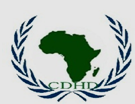During the period under review, the Armed Forces of the Democratic Republic of the Congo (Forces armées de la République démocratique du Congo —FARDC) conducted military operations against several armed groups in the eastern Democratic Republic of the Congo during a breakdown in military cooperationbetween the Government and the United Nations Organization Stabilization Mission in the Democratic Republic of the Congo (MONUSCO). As detailed below, the operations have thus far had limited success, failing to dismantle the targeted groups.Armed groups continue to pose a threat to the peace and stability of the area.
Operations against the Allied Democratic Forces (ADF) continued into a second year, but led to very few elements leaving the group during the period under review. The group’s sanctioned leader, Jamil Mukulu, was arrested, but its hierarchy appears otherwise largely intact. The group continues to operate in the area around Beni.
The voluntary disarmament process of the Forces démocratiques pour la libération du Rwanda (FDLR) came to an end in January 2015. Subsequent FARDC operations forced FDLR to retreat
from some of its positions and temporarily disrupted some of its revenue streams. The operations are continuing, but the military capacity of FDLR thus far remains intact. There were two attempts to negotiate with the Forces de résistance patriotiques en Ituri (FRPI) in late 2014 and June 2015, both of which failed and were followed by FARDC military operations against the armed group, the most recent of which is still under way. FRPI members were scattered as a result of the operations, but they continue to commit serious human rights abuses against civilians.
In the period from October 2014 to June 2015, between 350 and 450 civilians were killed in the Beni area, in North Kivu Province, in at least 50 separate incidents. Some of the killings were carried out by ADF. Both FARDC and MONUSCO failed to protect civilians from the repeated attacks.
Natural resources continue to be trafficked illegally, and armed groups and some FARDC officers are still benefiting from the exploitation and taxation of the resources. Mineral tracing tags conceived to ensure the traceability of minerals continue to be sold on the black market in Rwanda, which can allow minerals sourced in conflict areas in the eastern Democratic Republic of the Congo to enter the internationalmarket.
While recent efforts to improve weapon marking and registration and stockpile management in the Democratic Republic of the Congo are welcome initiatives, they are not comprehensive and still allow for weapons and ammunition to be transferred to armed groups.
During the period under review, many armed groups operating in the eastern Democratic Republic of the Congo continued to recruit and use children.

